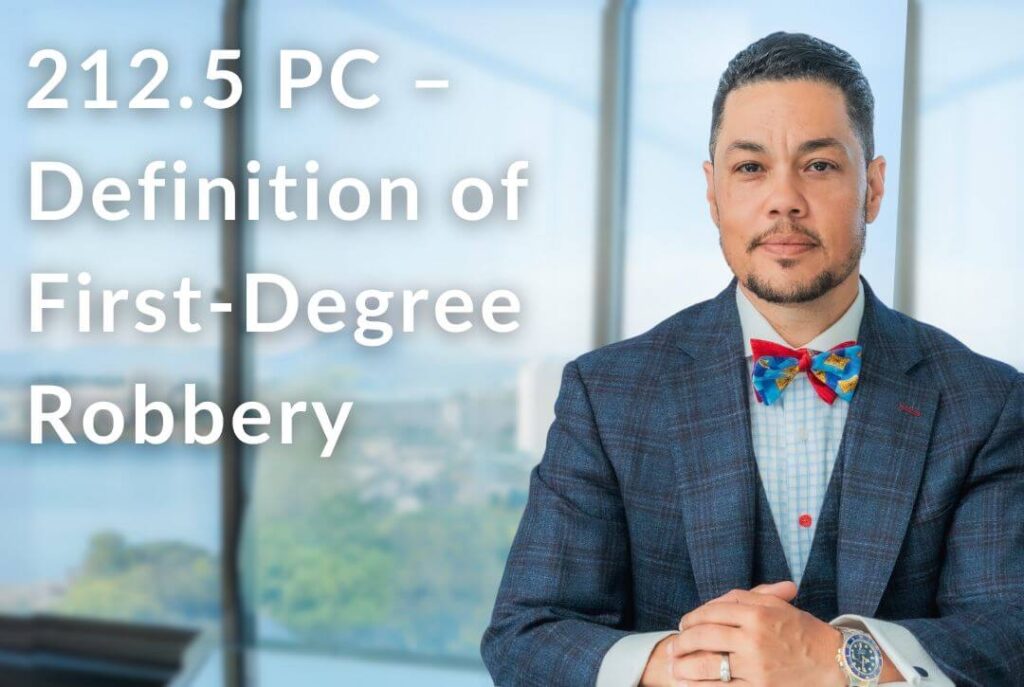Penal Code § 212.5 PC – Definition of First-Degree Robbery
Penal Code § 212.5 PC – Definition of First-Degree Robbery
First-degree robbery is one of the most serious theft crimes in California, carrying severe penalties that can dramatically alter your life. Did you know that robbery at an ATM is considered first-degree robbery, even if the victim is not physically harmed?
If you’re charged under Penal Code § 212.5 PC, you could be facing years in state prison, hefty fines, and a strike on your criminal record. These consequences can impact your future employment prospects, housing options, and personal relationships for years to come.
In this post, we’ll break down the legal definition of first-degree robbery, explore potential defenses, and discuss the penalties you might face if convicted.
Definition of First-Degree Robbery
First-degree robbery, as defined under California Penal Code § 212.5 PC, involves specific circumstances that elevate the severity of the crime. Understanding these definitions can help you grasp the seriousness of the charges and the potential consequences.
What Does the Law Say?
The law states that first-degree robbery involves taking property from a person using force or fear in specific situations. These situations include robbing a driver or passenger of a vehicle or a person in an inhabited dwelling. The legal language specifies various scenarios, ensuring that the crime is clearly defined and understood.
First-Degree Robbery Explained
First-degree robbery is a felony offense that can result in up to 9 years in state prison. It includes robbing individuals in vulnerable situations, such as while they are performing their duties as operators of vehicles for hire or while they are in their homes. The law aims to protect individuals in these scenarios by imposing harsher penalties for the perpetrators.
What Are Some Examples?
Examples of first-degree robbery include using force or fear to steal money from a taxicab driver, robbing someone on their boat, or holding a gun to a person and demanding their money right after they have used an ATM. These examples illustrate the types of situations that qualify as first-degree robbery under Penal Code § 212.5 PC.
Request a Free Consultation
Defenses for 212.5
Defending against a first-degree robbery charge requires a strategic approach and a thorough understanding of the law. Several defenses can be employed to challenge the charges and protect your rights.
Mistaken Identity
One common defense is mistaken identity. You might have been wrongly identified as the perpetrator due to factors like poor lighting, stress, or the actual robber wearing a disguise. Your attorney can present evidence such as alibis or witness testimonies to prove that you were not the person who committed the robbery.
No Robbery
Another defense is proving that no robbery occurred. It can involve showing that the alleged victim gave you the property willingly without any coercion or that there is insufficient evidence to prove that force or fear was used. Demonstrating the lack of key elements required for a robbery conviction can lead to the charges being dropped or reduced.
Falsely Accused
Being falsely accused is another defense strategy. It can happen due to personal vendettas, misunderstandings, or false allegations. Your attorney can gather evidence to show that the accusations are baseless and that you have an alibi or other proof of your innocence.
What Are the Common Defenses?
Common defenses for first-degree robbery under Penal Code § 212.5 PC include arguing that you did not use force or fear, the property was given to you without coercion, the structure was uninhabited, or you were unaware it was an inhabited home.
Additionally, mistaken identity and false accusations are also viable defenses. Your attorney can negotiate with the prosecutor to reduce the charges or even prevent formal charges from being filed.
What Are the Penalties for PC 212.5?
First-degree robbery under Penal Code § 212.5 PC is classified as a felony and is considered a violent crime under California’s “three-strike law.” If convicted, the penalties can vary based on the specifics of the case and any potential sentencing enhancements. Here are the key penalties:
- Standard First-Degree Robbery: Carries a maximum penalty of six years in state prison.
- Robbery of an Inhabited Structure: It can result in up to nine years in state prison.
- Acting in Concert with Two or More People: It carries a penalty of up to nine years in state prison.
- Great Bodily Injury Enhancement: If the robbery causes “great bodily injury,” a Penal Code 12022.7 PC sentencing enhancement can add an additional six years to your sentence.
- Third Strike: If the robbery is considered a “third strike” under California’s three-strike law, the penalty can escalate to 25 years to life in prison.
Related Offenses
Several crimes are closely related to first-degree robbery under Penal Code § 212.5 PC, including robbery under PC 211, grand theft under PC 487, and petty theft under PC 484.
Robbery – PC 211
Robbery under Penal Code § 211 is the act of taking someone else’s property directly from them or in their immediate presence, using force or fear. This offense is a felony and can result in significant prison time, especially if it involves aggravating factors similar to those in first-degree robbery. The penalties for robbery can vary, but they generally include substantial prison sentences and fines.
Grand Theft – PC 487
Grand theft, defined under Penal Code § 487, involves the unlawful taking of property valued at more than $950. Unlike robbery, grand theft does not necessarily involve force or fear but is still a serious offense. Convictions for grand theft can result in felony charges, leading to prison time, fines, and a permanent criminal record.
Petty Theft – PC 484
Petty theft, under Penal Code § 484, involves the unlawful taking of property valued at $950 or less. While generally considered a misdemeanor, petty theft can still carry significant penalties, including jail time, fines, and probation. Multiple petty theft convictions can lead to more severe consequences, including felony charges under certain circumstances.

As Seen On












Get Expert Legal Help for Your 212.5 PC Case
Understanding the intricacies of Penal Code § 212.5 PC and related offenses is crucial for anyone facing such charges. The post provides a comprehensive overview to help you navigate the complexities of the legal system and prepare for your defense.
If you or a loved one is facing charges under Penal Code § 212.5 PC, it’s essential to seek expert legal advice. At Huff Legal, our experienced attorneys specialize in defending against federal DUI and robbery charges, offering personalized and aggressive representation.
Contact us today to schedule a consultation and take the first step towards protecting your rights and securing the best possible outcome for your case.
Frequently Asked Questions
What is the Penal Code 212.5 PC in California?
Penal Code 212.5 PC in California defines first-degree robbery as including robbing a driver or passenger of a vehicle, a person in an inhabited dwelling, or someone who has recently used an ATM. This offense is classified as a felony and carries severe penalties, including up to nine years in state prison.
What is PC 211 felony robbery second degree?
PC 211 defines robbery as the taking of someone else’s property directly from them or in their immediate presence using force or fear. Second-degree robbery under PC 211 applies to all robbery cases that do not meet the criteria for first-degree robbery. It is also a felony and can result in significant prison time.
What is a first-degree burglary in California?
First-degree burglary in California involves entering an inhabited dwelling with the intent to commit theft or any felony. This offense is considered a felony and can result in severe penalties, including up to six years in state prison. The crime is more serious if the dwelling is occupied at the time of the burglary.
What are the elements of a 211 PC robbery?
The elements of a 211 PC robbery include taking personal property from someone else in their immediate presence, against their will, and using force or fear. All these elements must be proven for a conviction. The crime is considered more severe if it involves weapons or results in injury.
What Clients Say About Us





Schedule Your Free Consultation Today
LET HUFF HELP YOU
As a former police officer and patrol supervisor and his time spent as a United States District Court Judicial Law Clerk to the Chief Judge, Attorney Huff knows how to navigate all levels of the complex criminal law system. We also have more than 55 years of combined experience dealing with various complex criminal legal matters and have helped just over 1,500 clients over the past few years.
Why Huff Is Your Best Option For Criminal Defense
55+ Years of Combined Experience
At Huff Legal, we have more than 55 years of combined experience dealing with complex criminal legal matters, which can oftentimes be quite challenging. In order to get the outcome you deserve, you need a team of experienced attorneys on your side, who can help you navigate the legal system, so you can move past this situation and focus on the life ahead of you!
5 Star Rating on Google
We have a proven track record of success and are dedicated to our clients’ best interests. If you’re looking for a law firm that will always have your back, look no further than Huff Legal. Just have a look at some of our amazing client reviews over here!
1,500+ Happy Clients
Over the years, we’ve had the privilege of helping over 1,500 clients with their legal needs. When you work with us, you can be confident that you’re getting the best possible legal representation. We’re proud of our track record and our reputation for being a firm that delivers great results.
What Our Clients Say About Us


Sheila


Abel Resendiz


Manuela Frazier


Doris
Contact Huff Today
Request A Free Consultation
* Free consultations only available for Criminal Defense


In legal terms, an accessory to murder refers to an individual who aids, abets, or otherwise assists in committing a murder. While the specifics may vary across jurisdictions, California law treats accessories to murder as active participants in the crime, holding them accountable for their actions. In San Francisco Bay Area, there are two primary types of accessories to murder:
In the event that you find yourself in the Bay Area facing accessory to murder charges, you should first call a criminal defense attorney who can help you defend your rights and lessen the effects of the investigation. Contact an attorney at Huff Legal as soon as possible following your arrest. An accomplished attorney from Huff Legal will thoroughly examine your case, who will then develop a strategy and build a defense.
